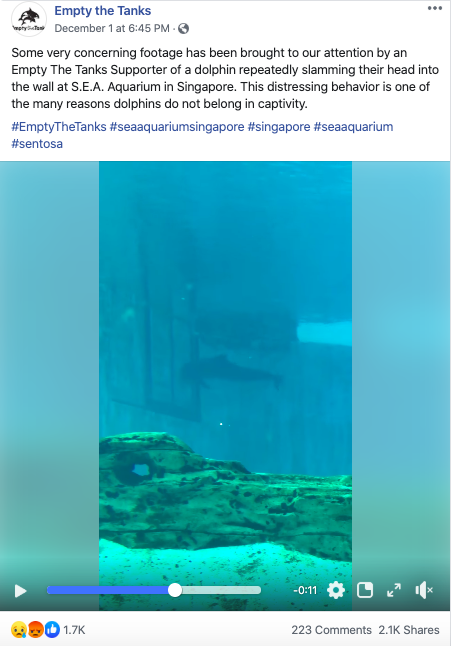Singapore—Advocates for local animal rights group ACRES (Animal Concerns Research and Education Society) has called for a boycott of Resorts World Sentosa (RWS) after a 2018 video emerged of a dolphin repeatedly slamming its head against the tank where its kept.
In a Facebook post dated December 6, ACRES wrote,
“THERE IS NO BEAUTY WITHOUT FREEDOM
It was heartbreaking to watch the video that was shared online, of a dolphin banging his or her head against the enclosure barrier, reportedly taken at Resorts World Sentosa, and anyone can tell that the dolphin in the video was suffering and displayed “abnormal” behaviour.
You CAN help these animals simply by not watching them in captivity.
Scientific studies have proven that marine mammals suffer in captivity. Keeping them in captivity for profits amounts to cruelty.
Remember, we’ve never seen, touched, heard nor smelled dinosaurs and yet most of us may know how they look like, what they eat and how they eat. How many people visit the dolphins but how many will truly learn how they play, eat, or work as a team to hunt or care for their young?
Boycott Resorts World Sentosa until they put an end to keeping dolphins in captivity.
#EmptyTheTanks #ThanksButNoTanks #EndAnimalCruelty“
A visitor to the SEA Aquarium at RWS allegedly witnessed this and out of concern, sent the video to an international animal rights group, Empty the Tanks, which uploaded the video on its Facebook page on December 1.
Rachel Carbary, who founded Empty the Tanks, told The Straits Times (ST) “During his visit, he witnessed the disturbing dolphin behaviour seen in the video and chose to record it. We have shared this video on social media in the hope of bringing more attention to the plight of these sentient animals that continue to suffer in captivity.”
Marine mammal scientist Dr Naomi Rose from the Animal Welfare Institute explained that what the dolphin is doing in the clip is called stereotypy, which means a repeated act that has no overt purpose. She says this kind of repetitive, pointless, even self-damaging behaviour is the essence of stereotypy.
A spokesperson for SEA Aquarium, where there are over 20 dolphins in captivity for the Dolphin Island exhibit, could not confirm whether the video clip was captured there.
Veterinarians from the Animal and Veterinary Service (AVS) at National Parks Board in Singapore went to see the dolphin pens at RWS on Thursday, December 5, and did not witness any “abnormal” behavior from the animals there, according to Dr Chua Tze Hoong, a group director at AVS.
RWS claims that the behavior of the dolphin was due to its ‘curiosity’ about its surroundings and people and that it is not that uncommon in dolphins. In a statement to Coconuts Singapore, RSW said, “We are uncertain of the source of the video but we can share some natural behavioural traits of dolphins.
Dolphins have a natural curiosity about people and their surroundings. They are also very social and enjoy playing with other dolphins.
As part of their natural behaviour, they communicate with each other through echolocation, making high-pitched clicking sounds and other playful actions such as nudging objects using their rostrums to attract attention.”
Haze prompts healthcare institutions to initiate diversified approaches to safeguard people

